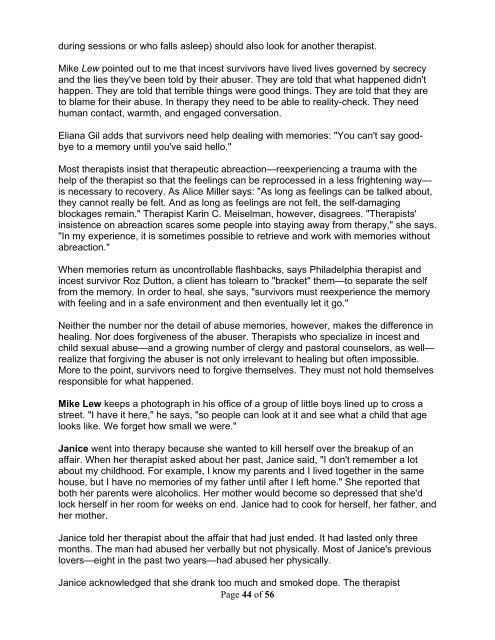Do you want to know what incest is? What it really is? No ...
Do you want to know what incest is? What it really is? No ...
Do you want to know what incest is? What it really is? No ...
Create successful ePaper yourself
Turn your PDF publications into a flip-book with our unique Google optimized e-Paper software.
during sessions or who falls asleep) should also look for another therap<strong>is</strong>t.<br />
Mike Lew pointed out <strong>to</strong> me that <strong>incest</strong> survivors have lived lives governed by secrecy<br />
and the lies they've been <strong>to</strong>ld by their abuser. They are <strong>to</strong>ld that <strong>what</strong> happened didn't<br />
happen. They are <strong>to</strong>ld that terrible things were good things. They are <strong>to</strong>ld that they are<br />
<strong>to</strong> blame for their abuse. In therapy they need <strong>to</strong> be able <strong>to</strong> real<strong>it</strong>y-check. They need<br />
human contact, warmth, and engaged conversation.<br />
Eliana Gil adds that survivors need help dealing w<strong>it</strong>h memories: "You can't say goodbye<br />
<strong>to</strong> a memory until <strong>you</strong>'ve said hello."<br />
Most therap<strong>is</strong>ts ins<strong>is</strong>t that therapeutic abreaction—reexperiencing a trauma w<strong>it</strong>h the<br />
help of the therap<strong>is</strong>t so that the feelings can be reprocessed in a less frightening way—<br />
<strong>is</strong> necessary <strong>to</strong> recovery. As Alice Miller says: "As long as feelings can be talked about,<br />
they cannot <strong>really</strong> be felt. And as long as feelings are not felt, the self-damaging<br />
blockages remain." Therap<strong>is</strong>t Karin C. Me<strong>is</strong>elman, however, d<strong>is</strong>agrees. "Therap<strong>is</strong>ts'<br />
ins<strong>is</strong>tence on abreaction scares some people in<strong>to</strong> staying away from therapy," she says.<br />
"In my experience, <strong>it</strong> <strong>is</strong> sometimes possible <strong>to</strong> retrieve and work w<strong>it</strong>h memories w<strong>it</strong>hout<br />
abreaction."<br />
When memories return as uncontrollable flashbacks, says Philadelphia therap<strong>is</strong>t and<br />
<strong>incest</strong> survivor Roz Dut<strong>to</strong>n, a client has <strong>to</strong>learn <strong>to</strong> "bracket" them—<strong>to</strong> separate the self<br />
from the memory. In order <strong>to</strong> heal, she says, "survivors must reexperience the memory<br />
w<strong>it</strong>h feeling and in a safe environment and then eventually let <strong>it</strong> go."<br />
Ne<strong>it</strong>her the number nor the detail of abuse memories, however, makes the difference in<br />
healing. <strong>No</strong>r does forgiveness of the abuser. Therap<strong>is</strong>ts who specialize in <strong>incest</strong> and<br />
child sexual abuse—and a growing number of clergy and pas<strong>to</strong>ral counselors, as well—<br />
realize that forgiving the abuser <strong>is</strong> not only irrelevant <strong>to</strong> healing but often impossible.<br />
More <strong>to</strong> the point, survivors need <strong>to</strong> forgive themselves. They must not hold themselves<br />
responsible for <strong>what</strong> happened.<br />
Mike Lew keeps a pho<strong>to</strong>graph in h<strong>is</strong> office of a group of l<strong>it</strong>tle boys lined up <strong>to</strong> cross a<br />
street. "I have <strong>it</strong> here," he says, "so people can look at <strong>it</strong> and see <strong>what</strong> a child that age<br />
looks like. We forget how small we were."<br />
Janice went in<strong>to</strong> therapy because she <strong>want</strong>ed <strong>to</strong> kill herself over the breakup of an<br />
affair. When her therap<strong>is</strong>t asked about her past, Janice said, "I don't remember a lot<br />
about my childhood. For example, I <strong>know</strong> my parents and I lived <strong>to</strong>gether in the same<br />
house, but I have no memories of my father until after I left home." She reported that<br />
both her parents were alcoholics. Her mother would become so depressed that she'd<br />
lock herself in her room for weeks on end. Janice had <strong>to</strong> cook for herself, her father, and<br />
her mother.<br />
Janice <strong>to</strong>ld her therap<strong>is</strong>t about the affair that had just ended. It had lasted only three<br />
months. The man had abused her verbally but not physically. Most of Janice's previous<br />
lovers—eight in the past two years—had abused her physically.<br />
Janice ac<strong>know</strong>ledged that she drank <strong>to</strong>o much and smoked dope. The therap<strong>is</strong>t<br />
Page 44 of 56


